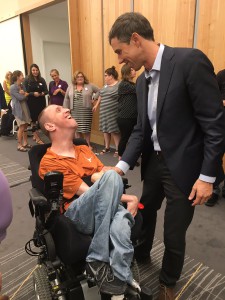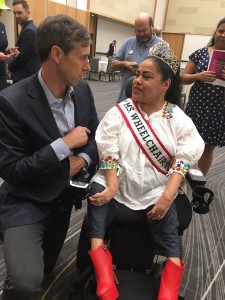Washington, D.C. April 22 – Before 2018, most of the country had never heard of former Congressman Robert “Beto” O’Rourke (D) from the 16th District of Texas. Today, he is a household name due to his nearly successful, entirely grassroots, U.S. Senate campaign during the 2018 midterm elections. O’Rourke narrowly lost the election to Republican Sen. and former presidential candidate Ted Cruz (R-TX). Many considered the Democrat’s near-win quite an accomplishment since Texas is such a stronghold for the Republican Party. So, when Beto announced his run for President of the United States last month, many were excited.
For a presidential candidate to represent and bring together all Americans, he must include people with disabilities. People with disabilities comprise 20 percent of our country’s population (25 percent of all adults in America), and more than half of Americans have a loved one with a disability. A recent survey shows that fully three-quarters of likely voters either have a disability themselves or have a family member or a close friend with disabilities.
Disability Is Personal to O’Rourke
O’Rourke’s 38-year-old younger sister, Erin, has intellectual and developmental disabilities. She grew up in public special education classrooms in and around El Paso, TX and currently lives in a community for intellectually disabled adults. He is close to his sister and instructs his aides that “unless he’s in an interview,” he will stop everything to take her frequent calls.
“Some longtime El Pasoans credit O’Rourke’s family with always proudly including Erin in all activities,” the Dallas News reported. What’s more, O’Rourke regularly mentions Erin on the campaign trail when discussing disability issues, particularly when it comes to education. And in doing so, he demonstrates he can relate to and empathize with more than half of the American population that has a loved one with a disability.

His devotion to inclusive education leads the conversation whenever O’Rourke is asked about disability, his instinct is to immediately discuss the Individuals with Disabilities in Education Act (IDEA) and disability education. He supports fully federally funding the IDEA in our public school systems. He believes that capping the number of students who can receive special education within a classroom is unconstitutional and arbitrary. He strongly supports integrated classrooms, where students of all and various abilities learn together to cultivate a culture of acceptance. And he believes parents and families of those with disabilities should be writing our federal legislation on disability education, rather than those who are untouched by disability.
O’Rourke’s Congressional Record on Disability Is Slim
While disability rights may be personal to him, they were not on his radar that often during his three terms as a U.S. Congressman from Texas. During his tenure as Representative, he only sponsored two bills that directly related to disability.
-

photo credit: House.gov In 2017, during his last term and on the campaign trail, O’Rourke cosponsored the Transitioning to Integrated and Meaningful Employment (TIME) Act to end sub-minimum wage. The TIME Act would prohibit employers from obtaining new permits to pay sub-minimum wage to workers with disabilities. It would phase out the program altogether for employers already paying sub-minimum wage to workers over the next six years. And it would help workers with disabilities who currently receive sub-minimum wage, often as little as 31 cents an hour. to transition to competitive employment (minimum wage and above). The bill has not passed, but it has pretty strong bipartisan support.
- Also in 2017, during his failed bid to the Senate, he signed on to cosponsor the Disability Integration Act (DIA). The DIA would require private health insurance companies to cover long-term care, including in-home nursing and personal care services that provide people with disabilities the independence and freedom to live in their own communities. Today, the bill still struggles to move forward or gain much bipartisan support.
The bills legislators vote against are just as important as the ones they introduce or sponsor. In 2017, O’Rourke voted against the ADA Education and Reform Act, which would require individuals with disabilities to put businesses on notice for violating accessibility laws before they could sue under the Americans with Disabilities Act. He believed strongly that this would dismantle the ADA and unfairly shift the burden of accessibility from the business to the individual with a disability. Disability lobbyist organizations encouraged him to vote against this bill, and he proudly admits to taking their advice and voting no. While his record on disability is not as strong as some of his adversaries, he has been vocal and protecting disability rights.
O’Rourke Promises to Include People with Disabilities in His Campaign and Administration

Soon after announcing his bid for the presidency, O’Rourke held a campaign event in New Hampshire where he was asked by a constituent how he is making his campaign events accessible and whether his staff reflects the 20 percent of Americans who have a disability. He responded by stating that he planned to hire people with disabilities to leadership positions in his campaign and, later, administration. This, he believes, is the only way to properly address the community’s needs, including accessible campaign events, which he plans to improve.
His statement was such an incredible and novel campaign promise that it was reported by news publications across the country, including the New York Times and the Washington Post. With 74 percent of U.S. voters having a loved one with a disability, hiring people with disabilities to hold leadership positions in campaigns should not be so rare. Mayor Pete Buttigieg is the only other 2020 candidate to have made a similar public pledge.
“The unfortunate fact is that stigma is still a driving factor in why two-thirds of people with disabilities are unemployed,” said RespectAbility’s Vice President, Communications, Lauren Appelbaum, who leads the organization’s nonpartisan political outreach efforts. “There is no better way to disprove the idea that people with disabilities are not able to work than by hiring them to ultimately work for the highest office in the land.”
O’Rourke Talks Medicaid and Home and Community Based Services on the Campaign Trail
In February 2018, during his Senate campaign, O’Rourke posted a Facebook Live video of a visit he made to a friend and her family. His friend and Disability Policy Advisor, Laura Lehman, her husband, Gary, and her son, Victor, who is categorized as “Medically Fragile” appeared on the video to discuss Medicaid and Community Based Services and demonstrate the life-saving services they provide. She showed all the breathing and medical equipment her son uses from home, while the family gave Victor a breathing treatment. They demonstrated how, without these services, Victor would be institutionalized or worse.
And in July of 2018, he revisited the issue of Medicaid for people with disabilities on Facebook and Twitter. He wrote:
“Working families with disabled children can get help from the Medicaid buy-in program, but they can’t qualify for it if they earn more than 150% of the fed. poverty level ($36,450 for a family of 4 in TX). This leaves those who most need care without it. Many families register on first-come, first-served lists for aid, equipment, home care and other services. But these lists can stretch more than 10 years. And because Texas declined to expand Medicaid, some lists stretch to thousands of names. …”
These posts highlight the experiences of his friend, Laura, and her family, as well as millions of other Americans with disabilities and their families.
O’Rourke Remembers ASL Interpreters But Forgets Video Captioning

O’Rourke’s presidential announcement speech was given to a large and spirited crowd in El Paso, Texas. In an incredible move of inclusivity and solidarity, he had three American Sign Language (ASL) interpreters on stage with him. Many politicians fail to provide even one ASL interpreter at their events, and when they do, they often hide them in areas that are difficult for the general public to see. O’Rourke made neither of these mistakes at his announcement speech, placing the interpreters front and center for the crowd to see. And he regularly provides ASL interpreters at his campaign events.
However, the video coverage of his campaign launch rally provided on YouTube, his website and social media fail to keep an interpreter in frame or offer any form of captioning. This seems to be an unfortunate pattern. Few of his videos on Facebook and Twitter provide any form of captioning. The likely reason his Facebook videos lack captioning is because they are made live, which would require live captioning. While it is standard for candidates to provide live video without captioning, they also, generally, later provide snippets of those videos on social media with captioning. In O’Rourke’s case, however, these snippets are not offered for most of his videos, leaving those with hearing impairments unable to participate in his social media campaign. Moreover, most people prefer to watch videos on mute with the captioning on. Failure for the campaign to provide captioning translates into most people simply scrolling past the video rather than listening, if they even can.
For a presidential candidate to be fully inclusive of people with disabilities, he needs to mention people by disabilities by name and discuss their issues. Many of the issues that our politicians discuss today from healthcare and education to employment and criminal justice greatly impact the disability community. O’Rourke’s announcement speech, however, failed to mention people with disabilities even once, despite including various other minority groups. And most of his stump speeches repeat this mistake. It is only when he makes the occasional social media post on disability, attends disability forums or is asked directly about disability issues that he discusses them.
O’Rourke Recruits Voters with Disabilities
O’Rourke is known to be genuine and personable, and voters with disabilities seem to agree. He regularly meets with disability organizations, activists and individual voters with disabilities and attends public disability forums to answer questions regarding disability issues. He listens to their concerns and takes their advice on the policies that would most benefit them. He often meets the voter at eye level, even if that requires sitting in a chair while speaking. with a wheelchair user. And he does so in a warm and inviting way that reads as authentic, more than polished.
His commitment to placing people with disabilities in positions of leadership in his campaign and, perhaps later, in the West Wing sends a strong message to the disability community that he does not just want their vote. If he carries out this promise, while providing more accessible and inclusive campaign events, speeches and media, he could very well capture a major swing vote and the largest minority in the country – people with disabilities.

[…] replied, “Yes,” during a campaign stop in the nation’s capital on April 4, making him and Beto O’Rourke the only two presidential candidates to make such a campaign promise on the […]
[…] Beto O'Rourke Campaigns with Disability In Mind […]
[…] Beto O'Rourke Campaigns with Disability In Mind […]
[…] D.C., June 12 – The inclusion of people with disabilities in society is personal to Rep. Robert “Beto” O’Rourke, whose youngest sister has an intellectual and developmental […]
[…] http://therespectabilityreport.org/2019/04/22/beto-orourke-2020-presidential-campaign […]
[…] with disabilities on the campaign has been addressed by two other presidential candidates: Beto O’Rourke and Pete Buttigieg. Both of them have promised to hire campaign staff with disabilities, […]